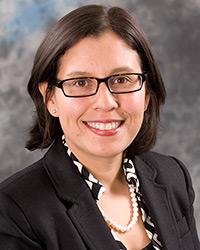Professor Studies Media's Influence on Health Decisions

From sunrise to sunset, people consume all kinds of information from television, online and from other sources.
UC Merced public health Professor A. Susana Ramirez wants to know how all that information influences people's health decisions and behaviors. Quite often, misconceptions about leading a healthy life can have serious implications on a person’s overall health.
For example, one paper she led shows that people who got health information from the media made healthier choices, including exercising more and eating more fruits and vegetables. There could be several explanations for this finding, including that people who sought information resolved to be healthier, or that information seeking reinforced an existing commitment to engage in healthy behaviors.
Before coming to UC Merced in 2013, Ramirez was a postdoctoral research fellow at the National Cancer Institute, which is based in Bethesda, Md. She earned a master’s in public health from Harvard University and a Ph.D. in communications from the University of Pennsylvania.
Ramirez, who is particularly interested in Latino health, plans to partner with San Joaquin Valley communities in her research, as well as using the findings to improve residents’ health.
"The San Joaquin Valley has a diverse Latino population, in terms of generation and language," she said. "There's a compelling case and need for the kind of research I'm doing."
Several studies by Ramirez that came out last year looked at how cancer is viewed and understood by different Latino populations.
One study, published in the Journal of Cancer Education, showed that highly acculturated Latinas hold fatalistic beliefs about cancer and its prevention — that developing cancer is outside of one’s control and that death is the inevitable result of a diagnosis. For example, one in five Latinas agreed with the statement that “There’s not much you can do to lower your chances of getting cancer.”
“For health education and communications practitioners, knowing that some fatalistic beliefs continue to be relevant for this population is useful information for understanding how to do ‘cultural’ or ‘ethnicity-based’ tailoring beyond the surface level,” Ramirez wrote.
A separate study showed that people who are aware of physical activity recommendations also have higher odds of knowing that physical activity decreases cancer risk. Conversely, those who are not aware of the recommendations have lower odds of know that physical activity helps reduce cancer risks.
Ramirez wrote that the findings suggest outreach and education efforts aimed at improving cancer education should encompass broad messages about cancer controllability through lifestyle choices.
